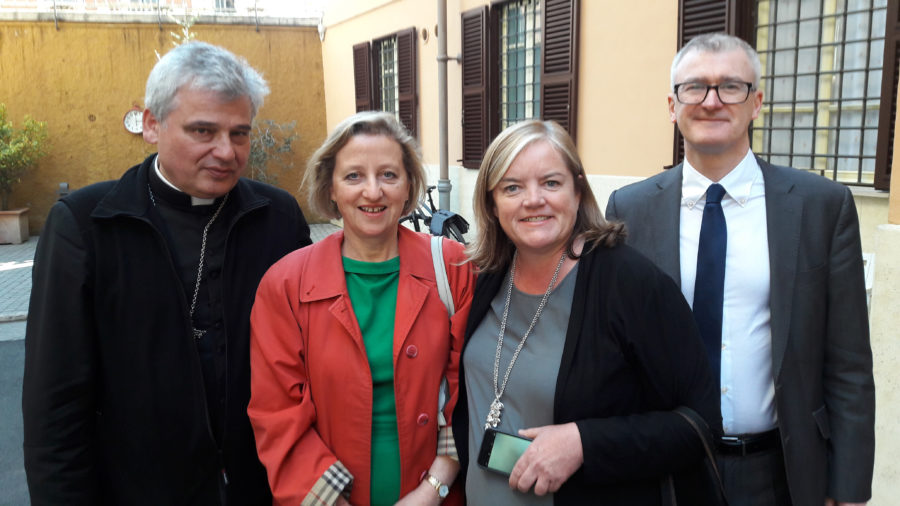20th March 2017 Holy See
Helping the Homeless at the Vatican

Last week I, Dame Louise Casey and Neil O’Connor of the UK Department for Communities and Local Government had the honour of visiting the Vatican Almonry to find out about how the Vatican helps the homeless. Dame Louise is something of a legend for her efforts to tackle homelessness, help troubled families and promote integration in the UK. She has just completed a report into opportunity and integration in some of the UK’s most isolated communities. She is also trustee of Depaul International, a charity that helps the homeless inspired by the work of Saint Vincent de Paul, and the Daughters of Charity that he founded.
Louise, Neil and I meet Archbishop Konrad Krajewski, the Papal Almoner at the Vatican’s ‘Elemosineria’ or Almonry, meaning a place where alms are distributed, just inside the Vatican walls. Although the word is slightly archaic, it turns out that distribute alms is exactly what they do. Archbishop Krajewski explains that they are the ‘emergency ambulance’ of the Vatican, taking people out of danger to a place where they can recover. When someone is in difficulty, they help. He gives us the example of a young man currently in his office who, after 5 months living on the streets, decided that morning he wanted to go home to the Netherlands. The Almonry sorted out his documents, provided him with a shower, and bought him a train ticket. If they hadn’t, the Archbishop tells us, he would have gone back on the streets.
The Archbishop gives us many more examples. The Pope asked him to help migrants on Lampedusa after a boat capsized and many drowned. The Archbishop decided the most important need was for the survivors to be able to ring their loved ones. He went out and bought 1500 phone cards. Recently the Pope asked him to help the earthquake victims of Amatrice, now that interest in their plight was waning. He went to the region and bought up local produce to serve in the papal soup kitchens to help the Amatrician businesses survive. The Almonry runs a 40-bed hostel for the homeless and provides showers for 200 people each day beneath the St Peter’s colonnade. The previous evening his team fed 300 refugees at Tiburtina Railway Station. On retreat with the Curia (papal administration), the cardinals and bishops had read to them over dinner the diary of someone from Aleppo. Moved to help, the Archbishop transferred a large sum to Syria.
They have no process, no bureaucracy, no paperwork. If they see a need, they take the money from their account and buy what is necessary. They do not work 9-5, but when the help is needed. They are staffed by volunteers. They want to inspire others in the parishes and dioceses to do the same. The state can provide longer-term services. Their role is emergency help.
We ask how they are funded. Archbishop Krajewski shows us the papal blessings that they sell, parchment documents which the faithful can buy for special occasions. They receive donations too. The Archbishop tells us of an earthquake victim for whom they bought a tractor on the same day that he asked them for it. Reading the story, a donor in Milan gave them €1 million.
How do they decide whom to help? Archbishop Krajewski says they try to do what Jesus would have done. When Jesus saw 5000 hungry people, he did not ask them to wait two weeks while he applied to Pontius Pilate for funds. He fed them. They try to do the same.
In the car on the way out, we muse on the freedom they have, and the trust that underpins it. Governments could not work this way, but we could and does partner with the Church – on homelessness, and other issues. The combination of government structures and longer-term help, with the Church’s flexibility and focus on immediate needs, is powerful.